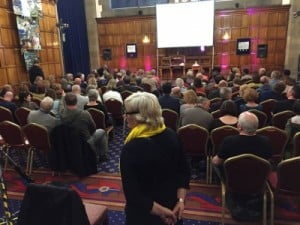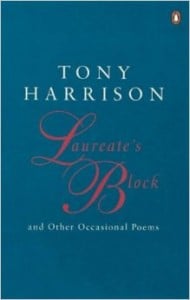Tony Harrison at Ilkley Literature Festival’s Words in the City
June 18, 2015
I last attended a reading by Tony Harrison at Salts Mill around twenty years ago. In the period between that event and the climax to this year’s Words in the City festival, Harrison has moved from robust late middle age, to the slightly frail but still intense and commanding figure who takes to the lectern at Bradford’s City Hall.
Accompanying the ageing process, there also seems to have been a key change, from major to minor.On the previous occasion, vivacious poems, like A Kumquat for John Keats and Fig on the Tyne were delivered with gusto; this time, a set that reflects more on Harrison’s roots and his public role has the audience leaning forward at times to catch the words – though that may have as much to do with a problematic microphone as the poet’s delivery.

Harrison’s working-class Leeds roots are covered by the first few poems, with the opener, Heredity, addressing the question of how someone of his background became a poet. The tongue-in-cheek response is that it came from two uncles: “one was a stammerer, the other dumb.” When he completes one of his best loved poems, Them & [uz], the audience cannot help bursting into applause. Harrison looks pleased, but politely asks for further applause to be kept for the end.
The poet is unhurried, at one point trying and failing to find the poem he wants to read. “The trouble is, I’ve written too many bloody poems,” he deadpans.
All of the works he reads are given context, meaning that an hour’s reading contains only ten poems – but the context makes pieces like Bookends, where Harrison sits with his father on the day of his mother’s death, or Timer, where his mother’s cremation takes him back to childhood times shared in the kitchen, extremely poignant, but without a hint of the mawkishness my summary might suggest.
With The Cycles of Donji Vakuf, Harrison turns to his role as a poet in the public eye. If literature is, as Ezra Pound suggested, news that stays news, this piece has the advantage of having begun its public life on the front page of the Guardian, when the newspaper had employed him to write on the ground in the Bosnian war. As ever, he finds humanity among the looting and brutality, but there’s not a shred of false comfort to take from that humanity.

The other major role that has put Harrison in the public eye is that of a poet for theatre, film and television. He describes some of what he calls his ‘kamikaze theatre’ exploits, which have included taking theatre to classical venues around the world. One such venture, which did not come to fruition because of political turmoil in the region, was an attempt to stage Euripides’ Iphigenia in Tauris in the most northerly known Greek Theatre, in the Ukraine, near where the original play was set. However, the experience did yield a poem, Black Sea Aphrodite, and Harrison’s reading from his own work concludes with a long extract from his ground-breaking Trackers of Oxyrhynchus, his play that had premiered at Delphi in Greece, before a one-off performance helped to reveal the potential of Salts Mill.
In the extract, read by Harrison – even though long-time collaborator and original cast member Barrie Rutter is in the audience – Silenus the Satyr comments on the flaying of his fellow Satyr, Marsyas, for daring to compete in a musical contest with the god Apollo. For Harrison, this is tailor-made as a fable about oppression and the appropriation of culture by a ruling class.
The power of Tony Harrison is that he will not allow this appropriation to take place uncontested.
Like Marsyas, the working-class Leeds lad has dared to compete in the rarefied atmosphere of poetry. Unlike Marsyas, he has succeeded spectacularly.
I am often given to wonder about the unpopularity of poetry. Everyone with a heart will have been shaken to the core by poetry at some time in their life, so why don’t they want more?
The answer, I suppose, is that everyone with a boredom threshold will have found it tested by obscure and self-indulgent poetry. The fact that hundreds of people – probably more than the national readership of many recently award-winning poetry books – are willing to come into the centre of Bradford on a Sunday evening, to hear a poet (a poet from Leeds!) who is closing in on 80, testifies that Harrison is a special kind of poet. He has been referred to as the people’s laureate, and even played on the idea in the title of one of his recent volumes, Laureate’s Block, but his qualities are self-evident.

He’s a master of poetic form, never its servant: all of the poems, like the majority of his work, are tightly rhymed and use a supple, natural sounding iambic verse, which gives the reader something to hold onto. He is relevant and forthright, able to comment on politics and global affairs without platitude. Finally, and most importantly, he communicates directly with the audience, which is both a product of, and the inspiration for, his career as a dramatic poet. The audience tonight exercised great restraint in saving their applause until the end. You got the feeling they would have liked to demand curtain calls, but perhaps they thought they’d asked enough of him already or perhaps poetry audiences are just less bold than this particular poet.
The Ilkley Literature festival takes place from 2-18 October 2015
Words in the City will return in June 2016
By Mike Farren
Filed under: Written & Spoken Word
Tagged with: Ilkley Literature Festival, poet, poetry, reading, Tony Harrison, Words in the City



Comments